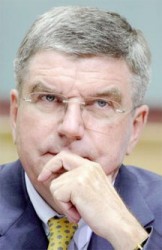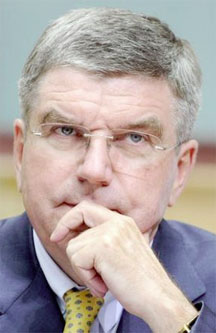(Reuters) – Gay rights activists yesterday asked International Olympic Committee (IOC) president Thomas Bach to launch an independent investigation into the implications of Russian law during next year’s Sochi Games, they said.
Bach met Russian activists during his two-day visit to Paris, IOC and gay rights organization All Out told Reuters.
“I can confirm a constructive meeting did take place,” an IOC official said.
The activists, who had flown from Moscow after others failed to meet Bach in Sochi earlier this month, raised their concerns over the law passed in June that bans “gay propaganda” among minors.
The law has been denounced by critics and in the West as discriminatory and aimed at stifling dissent, prompting some calls for a boycott of the Games..

President Vladimir Putin, who has hoped to make the Games a showcase of modern Russia, last month said all people would be welcome in Sochi.
However, gay rights activists have reported a rise of violence toward their community and stressed on Saturday that the law was not compliant with the Olympic charter.
“During the meeting, the IOC was urged to launch an independent investigation on the legal implications of the anti-gay laws … as these laws are infringing the Olympic charter and notably the sixth principle of non-discrimination,” All Out said in statement.
A list of questions that could help steer the investigation was handed to Bach, they added, saying they were expecting the IOC to announce within days whether it would proceed.
Though they did not receive any assurance of an investigation, the activists praised Bach’s willingness to listen to their point and urged him to take a stronger stance.
“It was a valuable conversation and we delivered first-hand evidence that a clear and strong action is needed,” Anastasia Smirnova, who attended the meeting, told Reuters.
According to Smirnova, who represents several gay rights groups in Russia, the so-called “propaganda law” has stirred a fresh wave of violence toward gays.
“The environment is becoming increasingly hostile, with private meetings broken into, gay clubs attacked and various homophobic groups calling for violence against LGBT people,” she said.
Gay activists in Russia and worldwide are hoping the Games will be more than a sporting event and will leave a social legacy.
“The Olympics are not simply a good way to draw attention. The Olympics have specific mission and goal of promoting non-discrimination and respect through sport,” Smirnova said.
“Russia is the place where this mission is much needed, allowing the 2014 Games to leave a positive legacy.”

